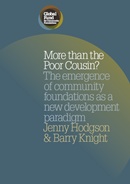Three community foundation infrastructure groups have decided to join forces. The Global Fund for Community Foundations, the Transatlantic Community Foundation Network, and WINGS-CF are exploring how to deliver a seamless service.
The new organization will discharge what have been identified as six vital functions:
- funding to support start-up, early-stage, and innovative practice;
- peer learning to share practice;
- technical assistance to provide expertise;
- legitimization to give new and emerging organizations credibility among their peers;
- convening to share information, especially beyond the boundaries of the field;
- research, information and publications to develop its knowledge base.
Proposals for delivering these services, developed with the field, will be discussed in a series of meetings, including one in Charlotte, USA in September, and the WINGS Forum in Italy in November. The new arrangements will be launched in Vancouver in May 2011 on the eve of the Community Foundations of Canada Conference.
There are also new studies to support the evidence base of community foundations. More than the Poor Cousin? is reviewed below, while the Global Status Report on Community Foundations will be released in November 2010 at the WINGS Forum. Other studies will be commissioned as needed. This work will culminate in a full business case for community philanthropy to be published at the Vancouver conference.
The field of community foundations appears to be at a ‘tipping point’. Despite a doubling in their numbers over the past decade, their value as a sustainable instrument for development and their capacity to deliver social capital is not well understood outside the field itself. If the field is to grow further, this needs to change.
Barry Knight from CENTRIS is supporting the organization of this process and would be interested in questions and comments. Email barryknight@cranehouse.eu
 Becoming a self-sustaining cousin?
Becoming a self-sustaining cousin?
Pamornrat Tansanguanwong
This new report by Jenny Hodgson and Barry Knight, More than the Poor Cousin? The emerging role of community foundations as a new paradigm, shows that a growing number of communities around the world have achieved promising results from the community foundation (CF) model, including building community trust, strengthening a culture of citizen participation and accountability, reaching poor and vulnerable groups, and encouraging the use of local resources to tackle local problems.
These are crucial elements for long-term sustainability which many development partners – especially international donors – look for when granting support.
But the report also reflects the overwhelming challenges that these often small and young organizations face, ranging from internal management and governance, changing public attitudes and building community trust, and combining fundraising and grantmaking. While this multi-faceted role makes CFs unique among civil society organizations, it is a tall order for a small organization with limited support. Because of this, one of the very first CFs in Thailand, for instance, has given up grantmaking and become a purely implementing organization.
One of CFs’ key strengths is to engage directly with the community. Through bottom-up participatory processes and social mapping exercises, CFs can identify the community’s needs as seen by the community itself. In many cases, both the process and its end product have helped improve local governance. It is important that CFs establish an independent working relationship with the government. Maybe the next research topic for the cohort of grantees could focus on CFs and local government.
Overall, this young sector has produced promising development outcomes. But it needs a great deal of technical, moral and financial support. In particular, both South-South and North-South dialogue and networking are crucial to its development and should continue to be encouraged to help the sector to become more self-sustaining in the future. The exchange on Muslim philanthropy between Egyptian and Thai CFs has led to the convening by Satun CF of a small group of Muslim businessmen who are considering ways to use waaguf and zakat for poor and vulnerable groups in the community. Such dialogue and learning is quite a powerful learning tool that could help the sector leaps forward with confidence.
Pamornrat Tansanguanwong is a social development consultant for the World Bank Bangkok Office. Email pamornrat@gmail.com
To download the report
http://www.globalfundcommunityfoundations.org/documents/MORE_THAN_THE_POOR_COUSIN_.pdf






Comments (0)